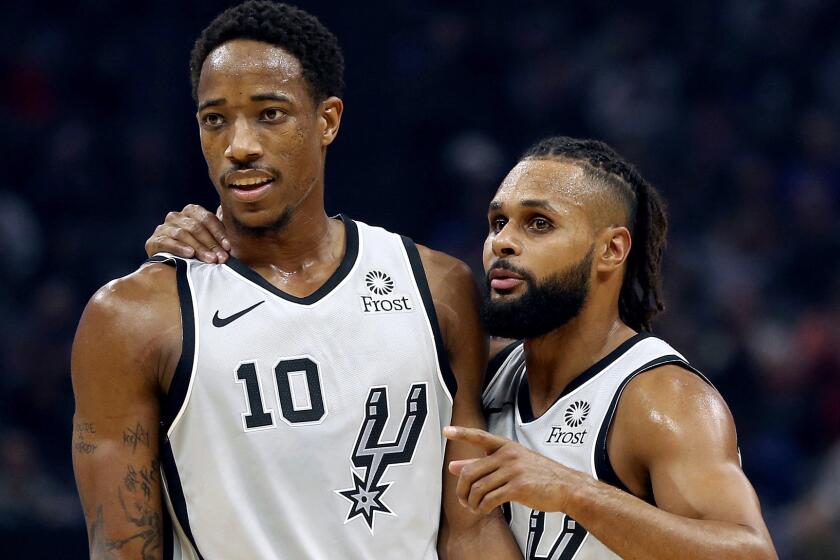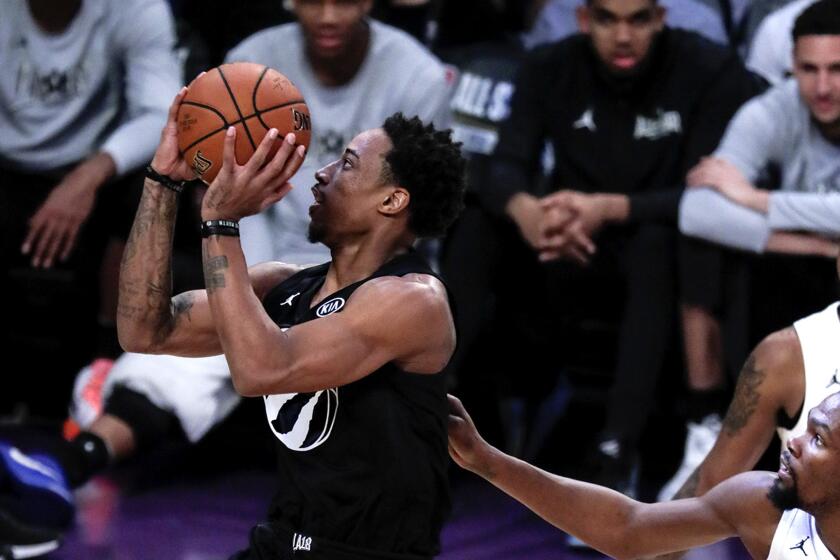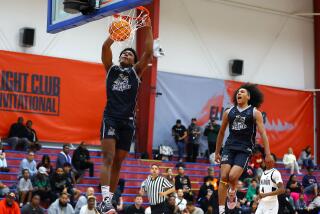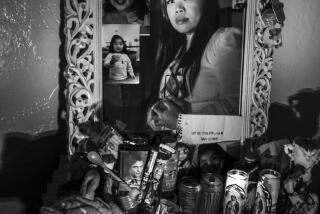A rising basketball prodigy, a pandemic, a fatal shooting. The Semaj Miller story
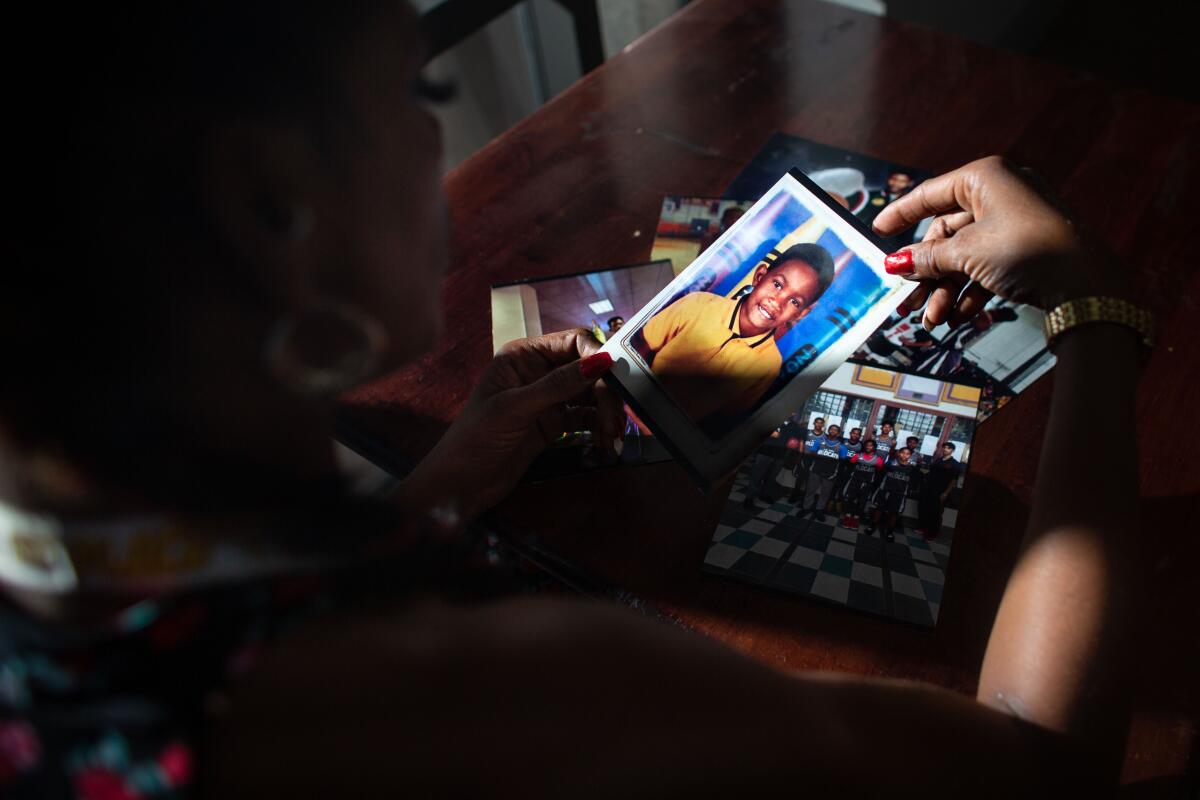
- Share via
The two coaches sat in chairs behind the basket along the wall of the brick-lined gym at Lueders Park in Compton and pondered the what-ifs.
Months earlier, before the novel coronavirus outbreak halted his youth basketball season, 14-year-old Semaj Miller perfected his dribbling and made shot after shot on that court.
Miller already stood 6 feet 6. Derrick Cooper and Tony Thomas predicted future stardom. They know NBA talent when they see it.
Cooper mentored James Harden, the 2018 NBA most valuable player with the Houston Rockets, in youth basketball. Thomas coached San Antonio Spurs star DeMar DeRozan at Compton High, where Miller intended to enroll this month.
But now, instead of looking forward to seeing Miller one day play at Staples Center, they are preparing for his funeral.
On July 29, officers from the Los Angeles Police Department responded to a call at 2:20 p.m. They found Miller unresponsive in a South L.A. courtyard surrounded by beige apartments. He had been shot to death.
The L.A. County medical examiner-coroner determined his death was caused by a gunshot wound to the torso.
The tragedy caught the attention of celebrity entertainers and athletes.
As friends and loved ones grapple with Miller’s death, the community at large is wrestling with a related issue: how to keep kids out of trouble amid a pandemic, which some claim is leading to a summer of increased violence and bloodshed.
::
When Miller started playing basketball at age 5, he didn’t completely understand the rules. Instead of dribbling to the basket, he found his mother, Taloma Miller, in the stands, walked over to her and handed her the ball.
“I was like, ‘What are you doing? Take the ball to the basket, not to me,’ ” Miller said, chuckling.
In a life marked by constant transition, Semaj’s mother and sports centered him and gave him focus. He was born in San Diego as the second youngest of five children. Semaj never knew his father, said Miller, who acknowledged struggling in the past with substance abuse.
The family moved between San Diego, Los Angeles, Azusa and Pomona as Taloma Miller switched jobs, ranging from Chuck E. Cheese to an assisted-living care worker.
All the while, she signed up Semaj for sports. He tried karate, boxing and soccer and played on a team in entertainer Snoop Dogg’s youth football league. But he gravitated toward basketball.
His height made him “built for it,” said his mother.
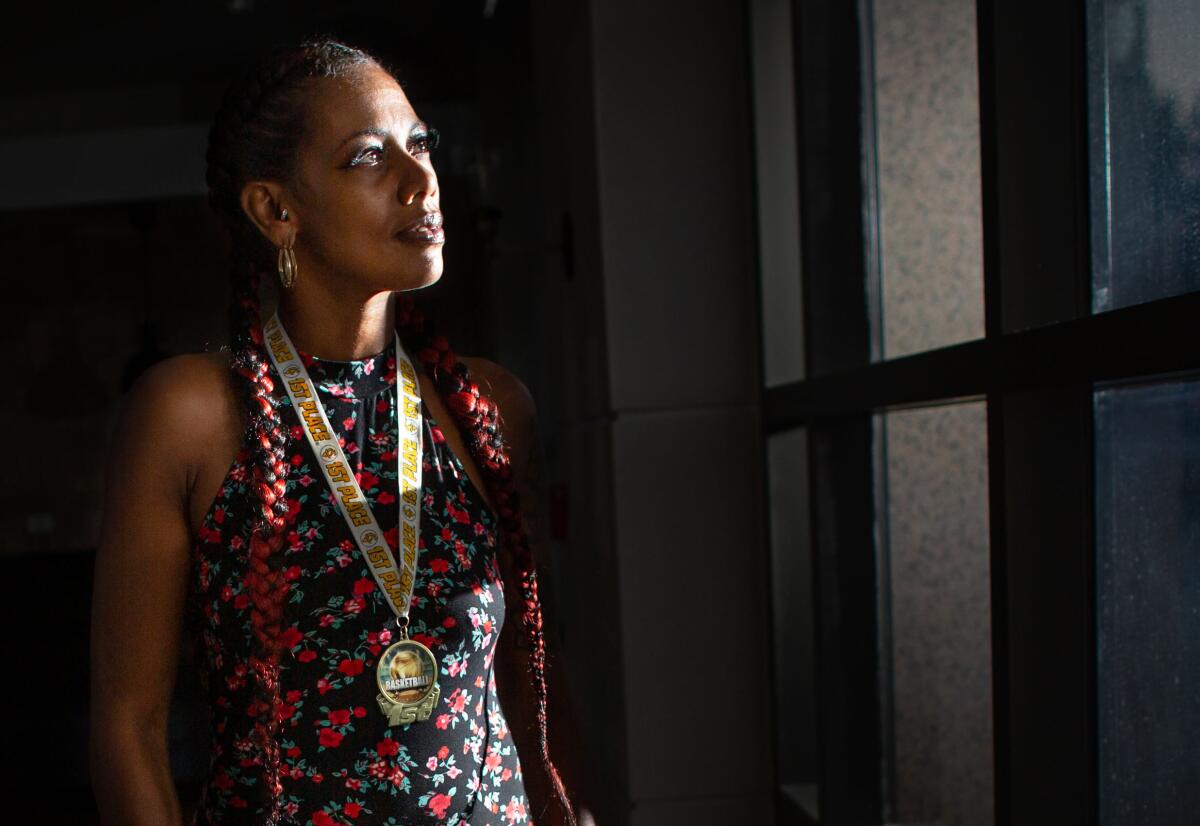
Nearly three years ago, through a housing assistance program, the family moved to a three-bedroom home off 94th Street and Main Street in South Los Angeles.
Semaj decorated his room with his personal game jerseys and trophies, his mother said. His size-16 shoes were scattered across the floor.
Miller said she was grateful to no longer worry about expensive rent payments. But she worried about safety.
“I thought if I minded my business and raised my children, making sure the household is taken care of and I didn’t affiliate myself with those doing negative things, we would be OK,” she said.
::
Derrick Cooper established the L.A. City Wildcats Youth Academy 23 years ago to give young people guidance and direction.
Semaj Miller “had a good heart” and “was always smiling” when he joined the program three years ago, Cooper said.
He wanted to play guard, but the team put him at center because of his height. That frustrated Miller, and one day he punched a teammate. Cooper and other coaches told him that unless he learned how to become a team player, he might have to find another sport.
Tim Duncan isn’t there, banking in 15-foot jumpers.
Miller started embracing his role. He also became more versatile. Coaches let him play on the wing to stretch the floor, and his shot improved. So did his work ethic.
Miller rode his bike or caught the bus to attend practices — sometimes riding his bike as many as 10 miles each way. He got so excited for games that he called Cooper multiple times before them to make sure he got picked up on time.
“I’ve never had a kid work as hard as that,” Cooper said. “It was like he knew he had to get it in because he didn’t have a lot of time. I would be like, ‘Man, chill, go watch TV or play some video games.’ ”
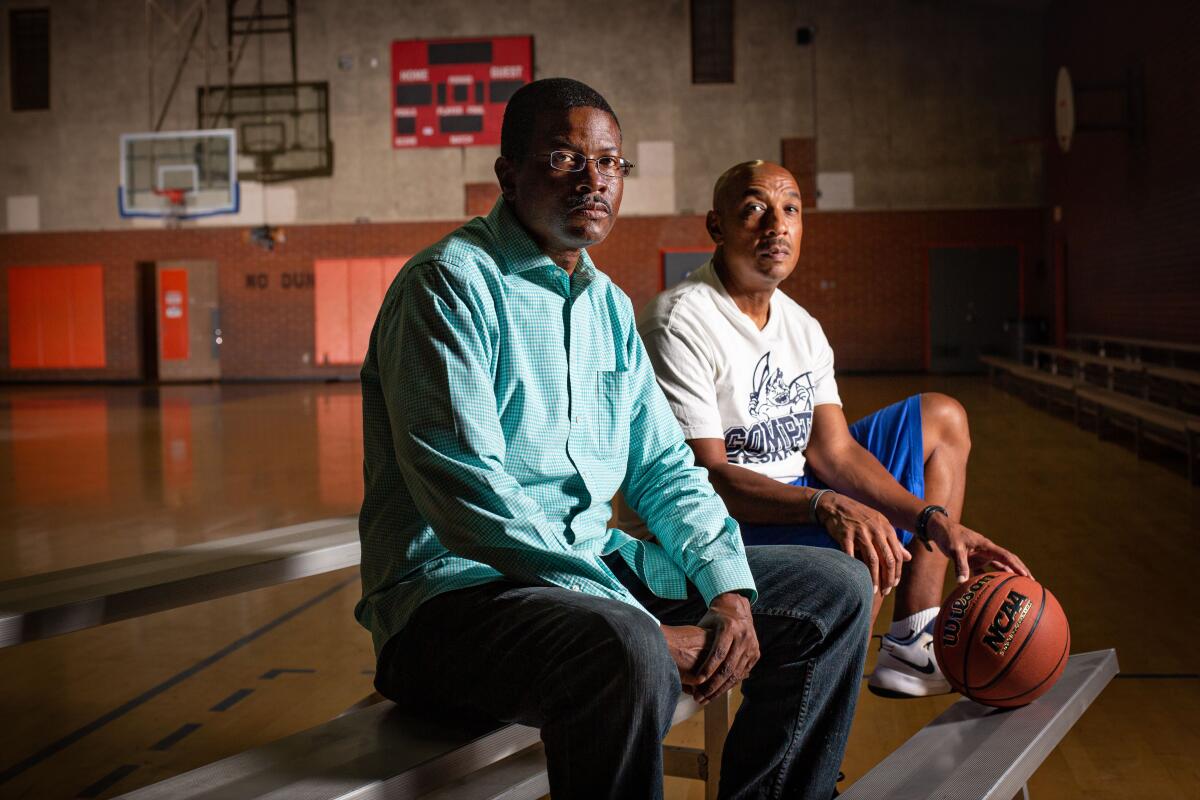
Miller’s enthusiasm rubbed off on his teammates, Cooper said. He cheered on younger players from the sidelines and formed close bonds with ones his age.
Two years ago, at a tournament in Palm Springs, Miller and teammate Henry Edwards spent time in the cheerleaders’ hotel room.
When Edwards’ grandmother walked in and found them, he said Miller took the blame, even though it wasn’t his idea.
“I couldn’t have another friend like him,” Edwards said.
::
About five months ago, Thomas watched Miller play for the first time. He liked what he saw: a tall, multifaceted player who could handle the ball and score in different ways.
The two clicked. Miller trusted Thomas, and he agreed that after he left middle school in Long Beach, he would play at Compton High. Things were lining up perfectly.
Then the pandemic struck.
Miller’s school switched to at-home learning. Basketball season was canceled. Parks closed.
But Thomas tried to keep him active. He gave him a workout routine at home.
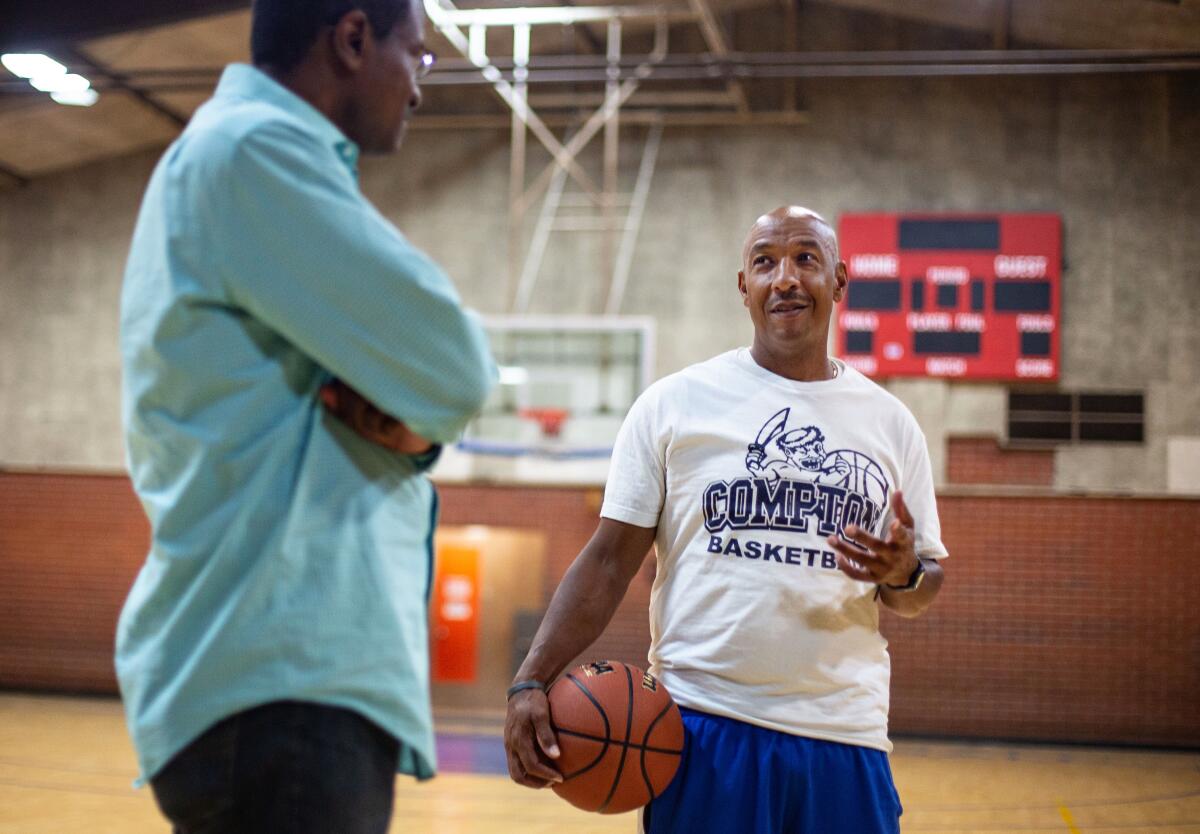
Before the NBA’s restart in Orlando, Fla., Thomas took Miller and a few others to DeRozan’s home in Hidden Hills, where they played basketball and swam in the pool.
DeRozan had met Miller previously and said he heard great things from Thomas.
“Whatever I could do, I always brought him in,” DeRozan said. “My biggest thing was just trying to show them something other than their environment.”
Miller’s mother and Thomas tried enrolling the teen in summer school, hoping to get a head start on math. But a paperwork snag stopped that from coming to fruition.
Without school or a place to practice consistently, Miller found idle time on his hands.
::
Taloma Miller told her son she loved him three times as he walked out the door.
It was a Wednesday, and Semaj and his mother had a date to do laundry together.
But first, Taloma Miller was going to take an afternoon nap while her son continued building an electric scooter nearby in the neighborhood.
The teen had filled the void of not playing basketball by picking up odd jobs, like selling candy and helping older neighbors with chores to earn money for parts.
When Taloma Miller woke up, her son hadn’t returned. She took a quick trip to the grocery store and plugged her phone into her car charger.
She then saw a text from a family friend.
Your son is dead.
When she pulled up to the location — an apartment complex on the 100 block of East 87th Place in Broadway-Manchester — she said authorities told her Semaj was found dead in the courtyard about five hours earlier.
“I couldn’t believe it,” she said. “Not him. He hasn’t done anything. He’s a big ol’ fun kid. A gentle giant.
“I wanted to faint, but I knew I had to be strong.”
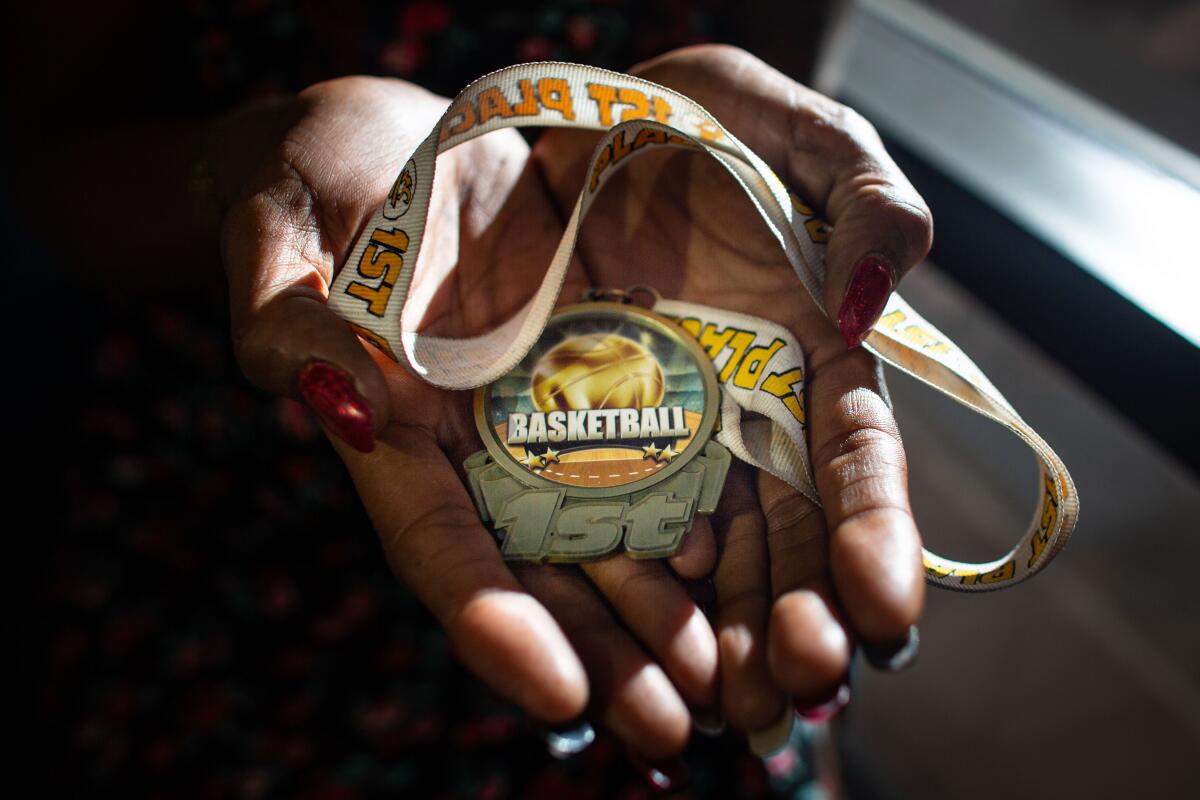
Authorities said they believe Semaj was shot after a dispute and do not think it was gang related. The unknown suspects remain at large.
Thomas said he had spoken to Semaj the night before, reminding him to do his push-ups. Cooper said Semaj was his seventh former player who has died from a shooting.
“I can’t accept that my kids are getting killed by just standing at a bus stop or walking over to someone’s house,” Cooper said. “And I’m not going to rest until we find a way to get these people identified at an early stage and lock their asses up where they cannot harm children anymore. I just can’t take it.”
DeRozan was heartbroken.
“It sucks, it’s painful,” he said. “My high school coach was always telling me he was ‘The Next One.’
“I know for sure my high school coach was going to treat him just like he treated me coming up, and that’s just to show him another side of the world — to be able to fight for something and make it out of that environment. It’s not right.”
DeMar DeRozan eased his way into the interview room Sunday night wearing a black baseball cap backwards, his black backpack slung over his shoulder and his feelings still raw from losing.
More than 100 people attended a candlelight vigil for Semaj, and an online fundraiser to aid Taloma Miller and her family has raised $12,000. Semaj was originally scheduled to be cremated, but Snoop Dogg and rapper Master P have stepped in to pay for his funeral and burial later this month.
Master P said his 14-year-old son played in the same league as Semaj, making the death even more personal. “What if James Harden died at 14?” he said. “We would have never gotten to experience his greatness. And now we’ll never get to see what Semaj could have become.”
::
Marqueece Harris-Dawson, a councilman who represents a portion of South L.A., said it never gets easier to mentally process homicides that occur in his district.
Los Angeles Police Department records show 184 homicides happened citywide from Jan. 1 through Aug. 8, a 17.2% increase compared to the same time in 2019.
LAPD Cmdr. Al Labrada is hesitant to link that increase solely to the pandemic.
But Taloma Miller and the teen’s coaches forcefully say that social-distancing restrictions contributed to his death.
If he had a gym to play in, they said, he wouldn’t have had a reason to be anywhere else. He would have been in Compton training with Thomas.
Because of the pandemic, programs intended to curb violence, such as the Gang Reduction and Youth Development Foundation’s “Summer Night Lights,” have been canceled or moved to a “grab-and-go” or virtual format.
Labrada said the LAPD has relied heavily on these programs for years, and he is concerned for kids now stuck at home. The pandemic may give them “opportunities to hang with wrong crowd,” making it especially tough for those without a strong family structure.
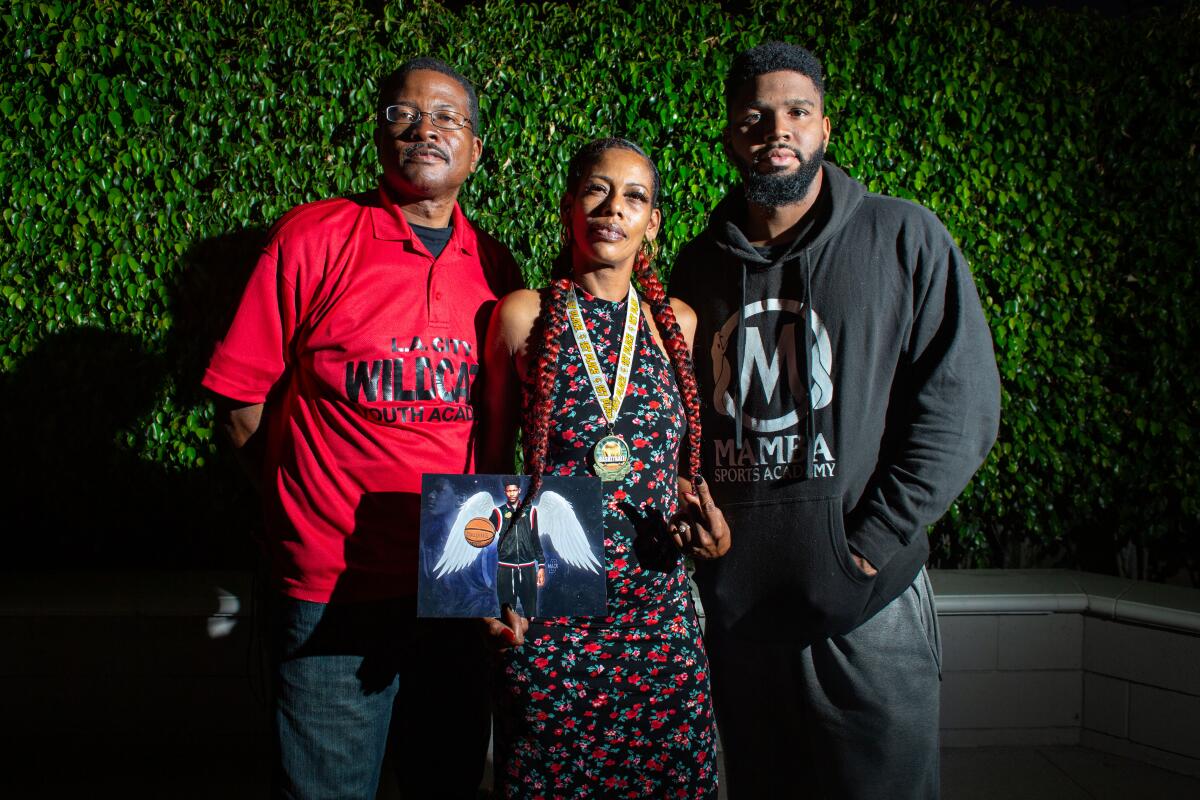
Skipp Townsend, a prominent gang interventionist, said it’s important to find new ways for youths to be active and together in an era of social distancing. “People need to be acknowledged and they need to be heard,” he said. “That can happen on the phone or on Zoom, but that takes away from that personal human interaction, and we need to get back to that, even if that means with a mask on.”
Harris-Dawson said he hopes the city and activists can get creative to find a happy medium.
“Let’s do something that engages young people and increases their talent in person, but keep them safe at the same time,” he said. “I do not like the stance of, ‘Oh, let’s all stay inside until the numbers go down.’ They may not go down in the immediate future, so we need to work our way around the current situation.”
Taloma Miller said she wants to start a nonprofit to remember her son and help kids who are in similar situations. Her son may be gone, but she wants his memory to live on.
And she doesn’t want another boy’s coaches sitting in a gym, grieving another tragic loss.
“God doesn’t make a mistake,” she said. “This is his will, and I am trying as hard as I can to look at the bigger picture. My son is going to set the tone for the rest of us.”
Times staff writers Tania Ganguli, Nicole Santa Cruz and Eric Sondheimer contributed to this story.
More to Read
Go beyond the scoreboard
Get the latest on L.A.'s teams in the daily Sports Report newsletter.
You may occasionally receive promotional content from the Los Angeles Times.
